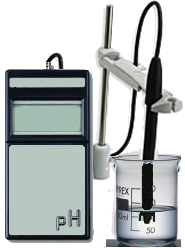





The nitrogen atom of the amine bears a lone electron pair. Like ammonia $NH_3$, amines are bases, because the doublet can capture an $H^+$ ion :

$R_1,R_2,R_3$ = hydrocarbon chain or hydrogen atom
Amines are bases
$CH_3NH_2$ $+$ $H^+$ $\rightarrow$ $ CH_3NH_3^+ $ methanamine and hydrogen ion react to form methanammonium $(CH_3)_2NH$ $+$ $H^+$ $\rightarrow $ $(CH_3)_2NH_2^+ $ dimethylamine and hydrogen react to form dimetylammonium $CH_3CH_2N(CH_3)_2$ $+$ $H^+\rightarrow$ $ CH_3CH_2NH^+(CH_3)_2 $ N,N-dimethylethanamine and hydrogen ion react to form N,N-dimethylethanammonium
Compare their $pH$:

$NaOH\; 0,1 \frac{mol}{L}$ $CH_3NH_2\; 0,1 \frac{mol}{L}$
Amines are weak bases
Compare their $pH$:

$CH_3NH_2\; 0,1 \frac{mol}{L}$ $CH_3CH_2NH_2\; 0,1 \frac{mol}{L}$
The $+I$ effect of alkyl groups enhances (weakly) the basic character.
This is because the $+I$ effect pushes away the lone electron pair of $N$ and therefore makes it more available to capture $H^+$ !
Compare their $pH$:

$CH_3NH_2\; 0,1 \frac{mol}{L}$ aniline $C_6H_5NH_2\; 0,1 \frac{mol}{L}$
The $-M$ effect of aryl groups decreases the basic character.
This is because the $-M$ mesomeric effect involves the lone electron pair of the $N$ by attracting it into the ring and therefore making it less available to capture $H^+$ !
Compare their $pH$:

$NH_3\; 0,1 \frac{mol}{L}$ $CH_3NH_2\; 0,1 \frac{mol}{L}$ $(CH_3)_2NH\; 0,1 \frac{mol}{L}$ $(CH_3)_3N\; 0,1 \frac{mol}{L}$
Order of increasing basicity: ammonia $\lt$ tertiary amine $\lt$ primary amine $\lt$ secondary amine
- The order: ammonia $\lt$ primary amine $\lt$ secondary amine is due to the increasing $+I$ effect of alkyl groupes. - Tertiary amines are less basic, because the three alkyl groups hinder approach of $H^+$ (actually the more voluminous $H_3O^+$) by steric hindrance that they cause.